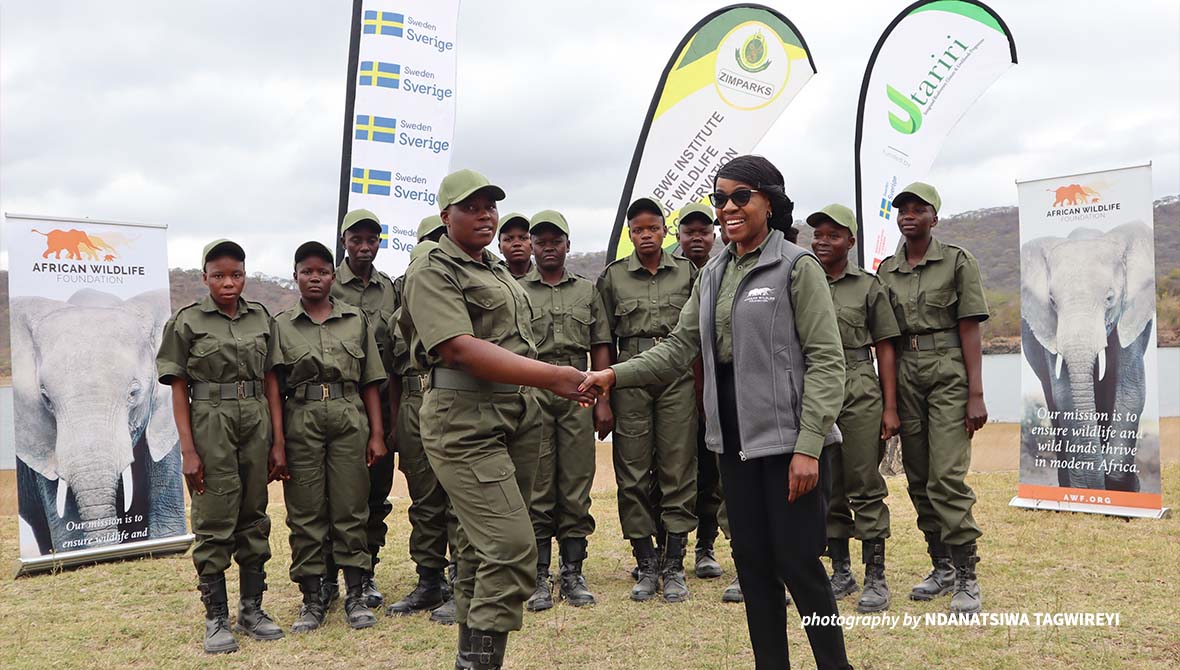Gender Inclusivity Celebrated at Wildlife Scouts Graduation in Zimbabwe
General Inquiries
Tel:+254 711 063 000
Ngong Road, Karen, P.O. Box 310
00502 Nairobi, Kenya

AWF Zimbabwe Country Director Olivia Mufute (right) congratulated the newly-graduated scouts
Masvingo, Zimbabwe (July 26, 2023) — A total of 28 community wildlife scouts drawn from Mbire and Muzarabani Districts graduated at the Zimbabwe Institute of Wildlife Conservation (ZIWC) in Masvingo following the completion of a basic ranger training course facilitated by the African Wildlife Foundation (AWF) under the ongoing Swedish International Development Agency (SIDA) funded ‘UTARIRI - Integrated and Adaptive Biodiversity, Climate and Livelihoods Project in the Zambezi Valley, 2022-2025.’
Almost half of the graduates were women, signifying the importance of gender inclusion in developmental aspects, including the conservation of natural resources and cultural heritage of two wildlife-rich regions in Zimbabwe.
“Witnessing such a great number of women graduating today shows gender balance in upskilling and training. I continue to advocate for the improvement of the girl child in wildlife conservation and I am happy today with the ratio that we have,” said Professor Never Muboko, Principal, Zimbabwe Institute of Wildlife Conservation.
The basic ranger training course, which took place from June 20, 2023, to July 21, 2023, included both theory and practical training modules, equipping community scouts with skills in ecological monitoring, ranger-based data collection, conducting problem animal management, communicating with stakeholders in wildlife-rich areas, as well as engaging the local community on conservation aspects using human rights-based approaches. With funding support from the SIDA under the Utariri Project, AWF also equipped these scouts with uniforms, including patrol boots critical for their work during anti-poaching patrols.
“You covered quite a lot of topics during your month-long training—among them, human-wildlife conflict, because I know from the areas that you come from, you face this on a daily basis. You also learnt human rights issues in law enforcement; I liked this topic because long ago, we did not learn much about human rights in law enforcement,” Professor Muboko highlighted. “All these topical issues make up a complete law enforcement package as they equip you to be competent and have skills and attitude that will enable you to combat wildlife crime.”
Additionally, AWF supported a two-week refresher ranger training course offered to another 15 scouts from Mbire and Muzarabani Districts under the Utariri Project, bringing the total number of scouts trained by AWF to over 40 individuals. The refresher training equipped community scouts with skills for planning anti-poaching patrols effectively, interpreting and applying wildlife protection laws in line with the Parks and Wildlife Act, taking the lead in community conservation projects, and applying ecological monitoring techniques for wildlife.
“This historic development has come as part of efforts to support community-level human-wildlife conflict management structures under the Utariri Project; this is in harmony with the AWF’s 10-year conservation strategy as we strive to conserve wildlife and reduce poaching and trafficking as major causes of the decline of key wildlife species in Zimbabwe,” Olivia Mufute, AWF Zimbabwe Country Director, said at the Mbire and Muzarabani RDC scouts’ pass out parade. “This would not have happened without the unwavering support from the Zim-babwe Parks and Wildlife Management Authority (Zimparks). The strong partnership that we have is indeed yielding positive results on the ground, including the upskilling of scouts that we have witnessed today.”
The Overall Best Student, Missy Muchadei (19), expressed her heartfelt gratitude to all the stakeholders who supported the basic ranger training.
“We would like to send a sincere thank you to our respective Rural District Councils, Muzarabani RDC, and Mbire RDC through the support of AWF for providing us with the necessary resources and funding to excel in our chosen field,” she said. “Your selfless act of supporting our training as game rangers is a testament of your commitment to conservation of natural resources.”
About the Utariri Project
‘UTARIRI - Integrated and Adaptive Biodiversity, Climate and Livelihoods Project in the Zambezi Valley, 2022-2025’ is a stewardship project with a focus on contributing towards sustainable management and utilization of natural resources, restoration of biodiversity, climate action, and building community resilience in the Zambezi Valley, Zimbabwe, funded through the Swedish International Development Agency (SIDA). ‘Utariri’ is a Shona word meaning ‘Stewardship’. The project focuses attention on the protection of biodiversity, harmonized response to sustainable development goals, agricultural production, provision of ecosystem services, integrated land management, and local livelihoods. The project’s outcomes center around increased community stewardship and sustainable utilization of natural resources focusing on pro-poor and gender-sensitive value chains, ecological restoration, and protection of wildlife habitats through broad-based biodiversity actions, enhanced participation of women and youths in livelihoods and resilience-building efforts as well as increased gender-sensitive public, private participation in sustainable biodiversity management, climate, and research.